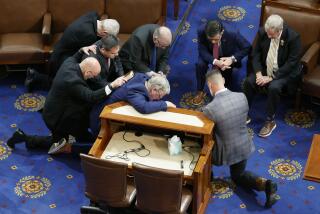Bush Calls for School Prayer in Campaigning for Helms : Politics: He avoids senator’s controversial positions. Aiding a man who opposed him shows President’s mixed relations with GOP colleagues.
ST. PETERSBURG, Fla. — Leaving Washington and its budget morass behind, President Bush traveled south Wednesday to campaign for Sen. Jesse Helms (R-N.C.), calling for school prayer and praising the conservative senator as a “defender of family values.”
Bush carefully avoided mentioning some of the more controversial issues that Helms has highlighted in his Senate reelection campaign, such as abortion, federal funding of the arts and opposition to civil rights for homosexuals.
But, speaking in Raleigh, N.C., to an audience of 500 party stalwarts--white except for 14 blacks and eight turbaned Sikhs--Bush echoed Helms’ chief campaign slogan, praising him for his adherence to “the values of North Carolina’s quiet, decent people, God-fearing good citizens who believe, for instance, as I do in returning voluntary prayer to our nation’s classrooms.”
Bush took a similar stance during his own election campaign in 1988 but, since becoming President, has largely ignored such conservative “social issues.”
The fund-raiser, expected to raise about $100,000, was the second campaign stop Bush has made for Helms, and it highlighted the mixed relations Bush has with his Republican colleagues in Washington.
Although Bush praised Helms for supporting him on crime, national defense and “values,” Helms has, in fact, voted against the President more than all but four other GOP senators. On Monday, Helms called the budget agreement that Bush supported a “turkey” and voted against it. This week, he has been leading efforts in the Senate to overturn a Bush veto of a bill that would impose new restrictions on textile imports, a measure Bush termed protectionist.
White House Chief of Staff John H. Sununu has argued that Bush should retaliate against Republicans who deserted him on the budget by restricting his campaigning for them. But Bush has refused to do so, and on Wednesday he downplayed his differences with Helms, removing from his speech a line acknowledging that “occasionally, we do not see eye to eye.”
At times during the day, Bush’s desire to cover all bases created strange juxtapositions. In campaigning in St. Petersburg later in the day for Florida Gov. Bob Martinez, a Republican seeking reelection, Bush praised Martinez’s support for White House proposals to strengthen the Clean Air Act, urging Floridians to vote for Martinez to help the Clean Air Act get through Congress.
The suggestion was unusual, because governors have no votes in Congress and the fate of the law will almost certainly be decided before November’s election. The remark seemed even odder because Helms, whom the President had praised only a few hours earlier, is one of the new law’s strongest opponents in the Senate.
GOP strategists say that Martinez is behind in his race against former Sen. Lawton Chiles, but Bush is heavily committed to the Martinez campaign, which is managed by his son Jeb.
In each of his campaign stops, Bush made general comments on the budget, saying he would “press hard for a budget that fulfills the spirit” of the “bipartisan plan” that was rejected last week by the House of Representatives. But he offered no new specifics on how he hopes to accomplish that.
And, although he emphasized that Congress will have to make “hard choices and real reductions,” he avoided any explanation of what sort of “hard choices” would be needed or why they would be necessary. Political analysts suggest that one of the reasons Bush’s budget compromise was so heavily rejected last week is that the President, after campaigning in 1988 on a theme of “no new taxes,” has not made much of an effort to explain to voters why he now thinks unpopular steps need to be taken.
Helms, himself, said almost nothing at his fund-raiser except for a brief slap at the local paper, the Raleigh News and Observer, in keeping with his campaign strategy of avoiding public appearances and concentrating, instead, on paid advertisements.
Polls show that Helms and Democratic nominee Harvey B. Gantt are in a tight race, although many political experts doubt that Gantt, who is black, can defeat Helms in North Carolina, where many communities are sharply polarized along racial lines.
A poll published in the News and Observer on Wednesday morning showed that 53.2% of the voters surveyed rated Helms’ performance as senator as only fair or poor. Only 42% rated him good or excellent. In March, when the paper asked the same question in a poll, Helms’ rating was 49% fair or poor versus 48% good or excellent. The poll did not ask voters about Gantt.
More to Read
Get the L.A. Times Politics newsletter
Deeply reported insights into legislation, politics and policy from Sacramento, Washington and beyond. In your inbox three times per week.
You may occasionally receive promotional content from the Los Angeles Times.









